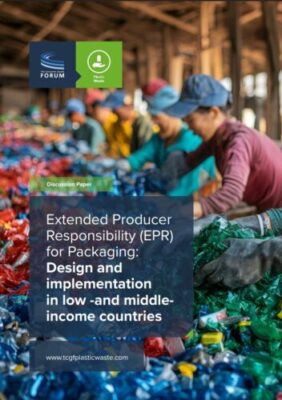Plastic pollution is rising fastest where waste systems are weakest. A new discussion paper from The Consumer Goods Forum’s Plastic Waste Coalition sets out practical steps to help low- and middle-income countries build fairer, more effective systems for managing packaging waste.
Plastic pollution is one of the most visible environmental challenges of our time. In many low- and middle-income countries, packaging makes up a large share of the waste found on streets, in rivers, and across communities – yet local authorities often lack the infrastructure or resources to manage it effectively.
To help address this challenge, the Consumer Goods Forum (CGF) Plastic Waste Coalition of Action has launched a new discussion paper, Extended Producer Responsibility (EPR) for Packaging: Design and Implementation in Low- and Middle-Income Countries. Building on The CGF’s 2022 Principles for Optimal EPR Design, the paper provides practical guidance for policymakers, businesses, and waste management stakeholders on how to create effective EPR systems in contexts where solid waste infrastructure is limited and the informal sector plays a vital role.
The guidance sets out six essential design and implementation elements, with particular focus on three priority areas:
- Institutions: Recommending a professional, not-for-profit centralised institution governed by producers and responsible for implementing and governing the EPR system. If an alternative model is chosen, ensure all core functions are fulfilled by these institution(s).
- Infrastructure: Encouraging EPR systems that attract public and private investment to address critical waste management gaps and guarantee long-term service revenue and contracts.
- Integration of the informal sector: Providing practical principles to ensure participation of informal waste workers in EPR governance, fair compensation for their service, and facilitation of contracting with waste pickers organisations.
The paper highlights that while EPR can be a game-changer for packaging waste, it is not a silver bullet. It must be implemented alongside broader investments in waste management systems and supported by coherent policies that promote reduction, reuse, and recycling.
Developed with input from CGF members, the Fair Circularity Initiative (FCI), and local experts, the paper was coordinated by Systemiq as secretariat of the Plastic Waste Coalition. The CGF hopes this guidance will spark continued dialogue and collaboration, helping to accelerate progress toward a circular economy for plastics worldwide.


